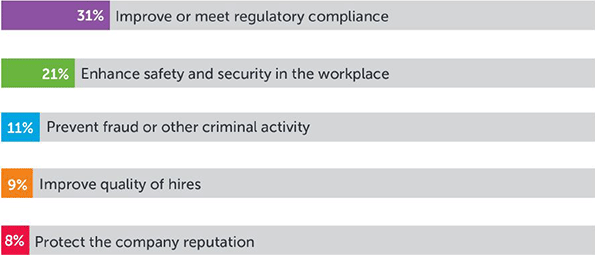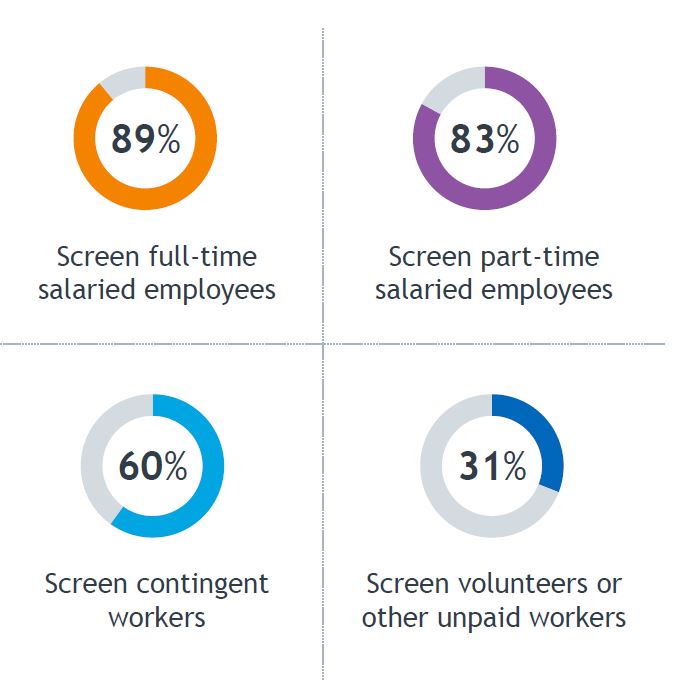April 5th, 2018 | Sterling
Background Screening 2018: Research Results and Insights
What do HR professionals in the UK think are important topics in their industry? Sterling surveyed over 300 UK-based employers in 33 industries about their use of background checks to gain key insights into emerging trends, technology and more. Sterling recently presented the webinar, “Background Screening 2018: Research Results and Insights” to discuss the key insights from the survey. Sterling’s Steven Smith and Jonathan Jacobi and Dominika Alzapiedi, Head of HR at EFG Private Bank discussed background check best practices, challenges and barriers, compliance matters and background check expectations for 2018.
Why Do Organisations Conduct Background Checks?
On a very basic level, background screening matters because it protects an organisation’s property, assets, reputation, brand and ultimately its biggest asset, the people. An employment background check provides a detailed look at a new hire, giving businesses the insight they need to make an informed hiring decision. We asked survey responders why they conduct background screening:

With GDPR updates going into effect on 25 May 2018 and Brexit occurring in a year, there is and will be many changes in the hiring compliance landscape in the next year.
Who is Being Screened?
What type of workers do employers conduct pre-employment screening for:

It is telling to see that 40% of respondents don’t currently screen contingent workers, even though this part of the workforce continues to grow at a lightning pace. Similarly, the survey results revealed that almost 70% of respondents don’t currently screen volunteers or unpaid workers, even though they may be just as much a part of the workforce. Choosing to not screen contractors, temporary staff or volunteers can pose a significant risk for employers, such as employee fraud and theft or hiring migrant workers who have no legal right to work in the UK.
What Background Screens Are Company’s Conducting?
New employees are one of the biggest investments a business can make. With each new hire, companies invest time, training, money and resources in the hope that their new employee will add to the success of the company. Background screening helps businesses make better, more consistent and more informed hiring decisions. From employment verifications to criminal record checks, it’s a proactive way to add another layer of risk mitigation into the hiring process.
Companies need to determine which type of background screening check is the most important to protect their employees and businesses. There has been an increase in companies utilizing third-party screening providers instead of conducting background checks in-house. The number of employers processing criminal record checks in-house has fallen from 30% from our last study in 2016 to 21% today and credit checks conducted in-house from 21% in 2016 to 7% today. But it’s not just data services which show a trend towards outsourcing, in the 2016 study, over 70% were processing employment verifications in-house while it now appears to be less than 60%.
Social Media Checks
In this time of constantly being connected socially to people around the world, the use of social media screening has continued to grow. The question about social media checks was not even included in our last survey in 2015! Our survey found that 60% of businesses don’t perform social media checks, yet more than half of UK HR professionals admit that candidates’ online reputations can influence hiring decisions, which suggests that some employers may carry out ‘off the record’ social media checks. Of the companies that do carry out social media screenings, two-thirds conduct them in-house and only one third outsource to a third party. With the prevalent use of social media, this type of check could be very important for companies to see if a candidate’s behaviour on social media could potentially cause a problem for an organisation. Social media searches must be compliant with discrimination and data protection laws, so employers should develop a clear policy for using social media during the recruitment process. Hiring decisions should be targeted on finding information relevant to the decision to offer employment and the specific position and not used for general trawling or “fishing” exercises.
Global Screening and Right to Work
79% of survey respondents employ foreign-born workers, but 40% don’t currently conduct or plan to conduct global screening in the next year. This may be due to the complexities associated with screening globally. Hiring foreign-born or international workers can be a great benefit to employers looking to diversify their workforces or fill any skills gaps, yet it can present significant screening challenges. Data protection and privacy laws vary between countries, making global screening an important, yet complex process for many organisations. Issues such as compliance with the EU’s GDPR data protection laws, the type of information that needs to be searched and how to interpret the results are key considerations for employers.
Background Check Challenges
The biggest challenge facing companies in this year’s survey is the time it takes to complete the background screening process, with 67% reporting it is too lengthy. This concern has doubled (33%) since our 2016 report. This may be due to increasing pressure to improve time-to-hire rates or the fact that some employers are expanding their background screening programmes. While a robust screening process can take time, outsourcing part or all of it could speed up time-to-hire, enabling the HR department to focus on the core functions of the department and reduce the burden on resources.
Benefits of Outsourcing Background Checks
There are many benefits of working with a third-party screening provider including enhanced efficiency, automated processes, objective reporting and working with a team who has the experience of working with a variety of clients and organsational sizes. They will also be able to help guide companies through the ever-changing compliance landscape and provide ways to create a positive and seamless candidate experience.
Importance of Having a Documented Background Screening Policy
The survey found that one in five organisations that perform background screening have no documented background screening policy in place. Employers should consider implementing a formal, written policy to maintain consistency, transparency and fairness for all. A policy is a crucial part of the screening process; however, it is especially important now with the introduction of the General Data Protection Regulation (GDPR), which impacts the way personal data can be accessed and managed but also places obligations on organisations to ensure the reliability of employees handling personal data. A background check policy will help to set expectations of the hiring process by being transparent with employees. It will also help avoid inadvertent discrimination and allow companies to respond to privacy complaints.
This is just a preview of some of the results from our 2018 Background Screening Survey. We will be sharing more of the insights over the next few months. To get more data and insight into the UK Trends and Best Practices Report listen to an On Demand version today.
Please note: Sterling is not a law firm, and does not dispense legal advice. The information provided herein is general business information, is not based on any particular facts or situations, and is not to be relied upon as legal advice, even if you are currently a client of Sterling. You are encouraged to seek advice from your own legal counsel concerning matters covered in this presentation.
This publication is for informational purposes only and nothing contained in it should be construed as legal advice. We expressly disclaim any warranty or responsibility for damages arising out this information. We encourage you to consult with legal counsel regarding your specific needs. We do not undertake any duty to update previously posted materials.
